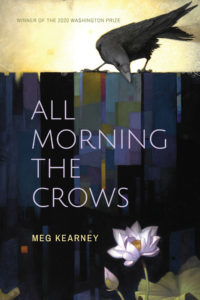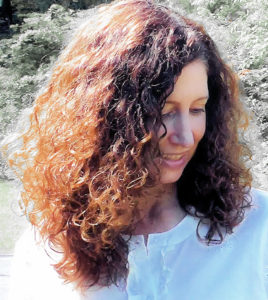|
MEG KEARNEY’s All Morning the Crows, winner of the Washington Prize for poetry, was published by The Word Works in 2021. Meg is also author of An Unkindness of Ravens and Home By Now, winner of the PEN New England L.L. Winship Award; a heroic crown, The Ice Storm (Green Linden Press, 2020); and three verse novels for teens. Her award-winning picture book, Trouper, is illustrated by E.B. Lewis. Meg’s poetry has been featured on Garrison Keillor’s “A Writer’s Almanac” and Ted Kooser’s “American Life in Poetry” series. She lives in New Hampshire and directs the Solstice MFA in Creative Writing Program in Massachusetts. Visit www.megkearney.com. |
 Book Title, Press, Year of Publication:
Book Title, Press, Year of Publication:
All Morning the Crows, The Word Works, 2021
Synopsis: “Against the backdrop of her parents’ death, the trauma of the Towers, and pervasive self-doubt, a young woman traces her history of flight, offering a narrative of heartbreak spliced with humor and filtered through the raucous assemblages of birds which inhabit her, ‘singing in the cage my bones make.’” –Michael Waters
What do you think makes your book (or any book) a “project book”?
What became All Morning the Crows began as a giant prompt I gave myself: to write 100 poems, each inspired by the birds described in Diana Wells’ 100 Birds and How They Got Their Names (Algonquin Books, 2001). Over the course of a year I managed to do just that, then set the pile of poems aside for nearly two years as I worked on a verse novel. When I came back to the bird poems, I realized that there were a few essential threads that ran through them, and that many seemed to speak to each other. (I also threw half of them out, and re-wrote virtually all of the rest.) Then this “thing” that had started as a sort of project took on a life of its own, and became All Morning the Crows.
Why this subject (or constraint)?
Some of the poems have little to do with the birds in their titles—in some cases, the bird serves as a launching point as the poem weaves its argument. The birds allow for an engagement beyond the self—beyond the “I”—while at the same time they are also a vehicle for diving deep into some very personal material.
Are you comfortable with the term “project book”?
Yes, though I don’t think of this as a “project book” – it’s a book that began as a project and then became this other thing.
Was your project defined before you started writing? To what degree did it develop organically as you added poems?
All I told myself in the beginning was that I would read each description in the Wells book, beginning with “Albatross,” and then write and see what happened. That’s exactly what I did. Later, I also started seeking other source materials—bird guides and the Cornell Lab of Ornithology, for example.
How important was it for you that each poem could “stand on its own” or that the poems should rely on other poems in the book, or on the premise of the project itself, to succeed?
To me it was essential that each poem stand on its own. At the same time, later on in the process, each poem also needed to “fit” within the fabric of the overall book. So, in the end, some poems that I felt were strong—poems I had even published in magazines—were left out.
At any point did you feel you were including (or were tempted to include) weaker poems in service of the project’s overall needs?
Any poem that felt weak was thrown out. In the end, I wound up with 51 birds / poems.
Do you have a sense of whether the fact that this is a project book helped position it to find publication more easily? Has it helped you find readers?
So many people of all walks of life are drawn to birds, so in that way I think some readers have come to All Morning the Crows expecting to read about our feathered friends. Especially crows. That’s why I’ve tried to be clear in stating that the poems aren’t necessarily about birds, but inspired by them. That said, my hope is that some of those who came to the book wanting to read about birds stayed for the stories told in these “bird poems”!
As a teacher, how do you see the prevalence of project books and other poetic constraints affecting your students’ writing?
Often I talk with students about the restraints that formal verse introduces to the craft of poetry, and—ironically—how freeing that can be. I haven’t considered “project books” within those same terms, but am now re-thinking that simply based on this question.
After completing a project, how did you transition into writing something new? What are you working on now? Another project?
Often I am working on more than one thing at a time, which makes it easy to keep going when a book comes out. At the moment I am trying my hand at some prose, but have the feeling I might be working on another crown of sonnets soon. If I go too long without writing a poem, I feel antsy and unmoored.
What advice can you offer other writers, particularly emerging writers or poetry students who may be using the project book as a guiding principle for their own work?
Don’t let the “project” you’re working on dictate what you’re writing—if something else starts to evolve in your work that doesn’t feel related to your “project,” then follow that new path. Your original project idea might have been simply what you needed to get you started. Just as it’s a bad idea to inflict your own intentions upon a poem, it seems equally unwise to do so on a larger scale.


